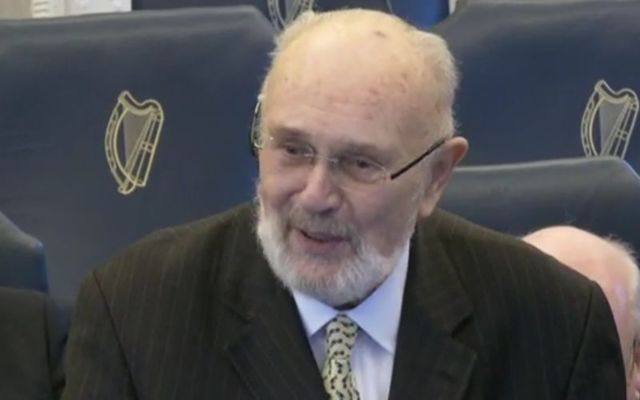Senator David Norris, 79, delivered his final address in the Seanad Éireann today, January 22, marking the end of his 36-year run as a Senator.
After thanking his colleagues and all those who voted for him over the years, Senator Norris said: "Since this is my last opportunity to speak on the floor of this House, I would like to continue to advocate for peace in Palestine, and in particular Gaza.
"What is happening to the inhabitants of Gaza is appalling and cannot be allowed to continue.
"Man's inhumanity to man is our greatest shame, and I have to say, also, that it goes completely against the Jewish ethic, which is 'l'chaim,' or 'to life.'
"The present [Israeli] Government under Netanyahu has committed them to death instead of to life, and to death in overwhelming numbers for the unfortunate trapped citizens of Gaza. I deplore it completely.
"What is happening is appalling and cannot be allowed to continue. Man's inhumanity to man is our greatest shame. I urge Senators to continue to push for peace in our times.
"Finally, I would like to voice my support for the forthcoming referenda on the family. It is important that they succeed, and even though I will be retired, I will be, to the best of my ability, campaigning for their success."
Norris, the first openly gay person to hold public office in Ireland, is credited with spearheading the battle to decriminalize homosexuality in the Republic of Ireland.
In the 1970s, Norris founded the Campaign for Homosexual Law Reform, which featured Mary Robinson and Mary McAleese, both future Presidents of Ireland, as advisors.
In 1983, Norris went to the Irish Supreme Court to challenge the constitutionality of the 1861 Offences Against the Person Act and the 1885 Criminal Law (Amendment) Act, laws which made homosexuality an offense that had been passed before Irish independence and had been since repealed in England, Wales, Scotland, and Northern Ireland. Norris was unsuccessful.
In 1987, Norris was elected to the Seanad as an Independent; he has been re-elected at each election since. Upon his resignation this month, Norris is the longest-serving member of the Seanad in the history of the Irish State.
The following year, Norris took a case to the European Court of Human Rights to argue that Irish law was incompatible with the European Convention on Human Rights. This time he was successful in his efforts, and the ECHR ruled that the criminalization of male homosexuality in the Republic of Ireland violated the right to privacy in personal affairs.
Five years later, Minister for Justice Maire Geoghegan-Quinn included decriminalization with an equal age of consent in a bill to deal with various sexual offenses. No parties in the Oireachtas opposed decriminalization.
Mary Robinson, who had represented Norris in his Supreme Court and European Court of Human Rights case, was President of Ireland and ultimately signed the act into law when it passed the Dáil in 1993.
Two days after the bill passed the Dáil, Norris wrote in the Irish Times: “When, next week, this Bill is passed by Seanad Éireann and sent to the President for signature I will, for the first time in my life, feel that I am at last a full and equal citizen in my own country.”
Norris has sponsored 34 bills throughout his tenure as a Senator. While he received several tributes in the SSeanad on Monday following his final address, he also received written tributes from Preisdent Michael D. Higgins and Taoiseach Leo Varadkar.
"Your legacy as a champion of equality and diversity will continue to inspire future generations to come," President Higgins wrote.
An Cathaoirleach Jerry Buttimer said in the Seanad on Monday that Varadkar wrote: "In your campaigns, you showed true leadership, standing for causes that were unpopular and poorly understood but, above all, were appealing to our best instincts as human beings: kindness, compassion, tolerance and acceptance."




Comments